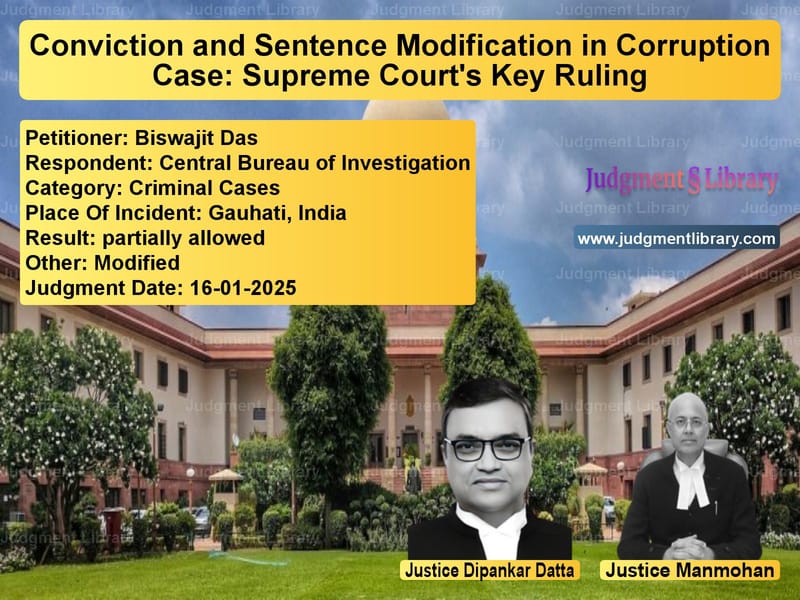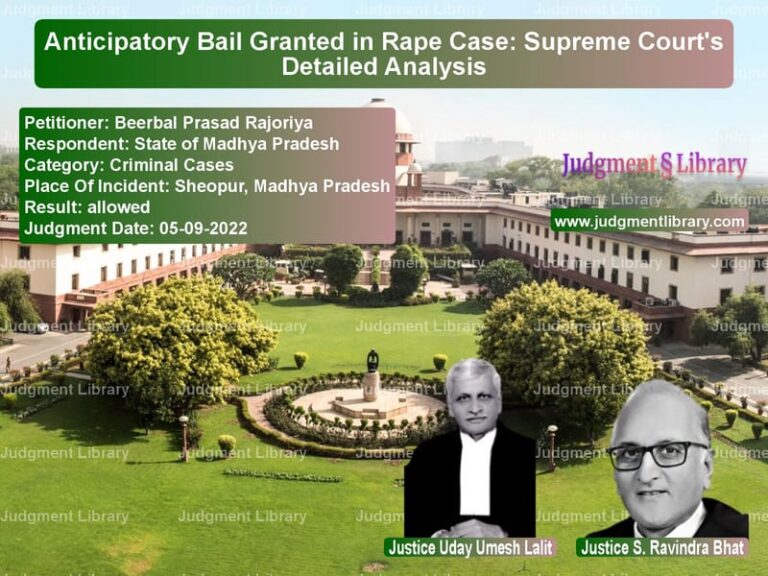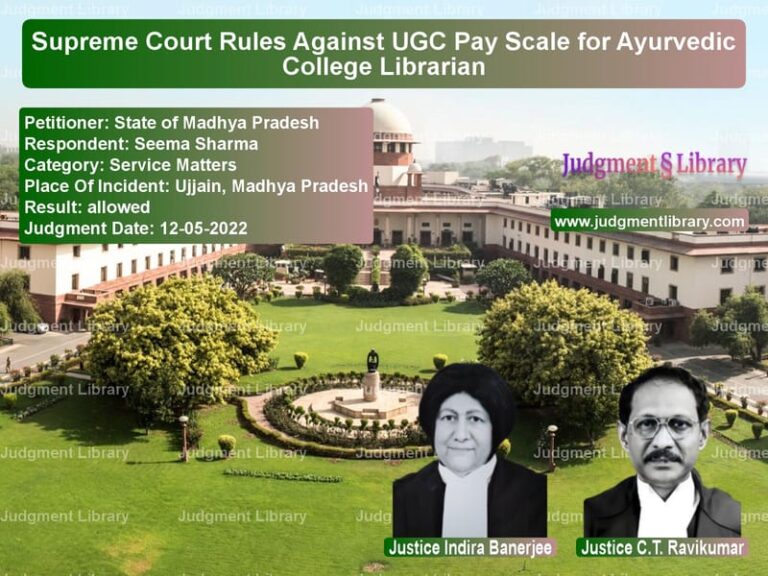Conviction and Sentence Modification in Corruption Case: Supreme Court’s Key Ruling
The Supreme Court recently delivered a crucial judgment in the criminal appeal case of Biswajit Das v. Central Bureau of Investigation. The appellant, Biswajit Das, was convicted under multiple sections of the Indian Penal Code (IPC) and the Prevention of Corruption Act (PC Act) for his role in a fraudulent insurance claim. The case raised significant legal questions, including the applicability of the PC Act and the Supreme Court’s power to reconsider the scope of an appeal beyond its initially granted notice.
The appellant, a Development Officer at the Life Insurance Corporation of India (LICI), was found guilty of colluding with a co-convict to falsely claim an insurance settlement by fraudulently declaring the insured person as deceased. The trial court sentenced him to rigorous imprisonment for various terms under different sections of IPC and the PC Act. His conviction was upheld by the High Court of Gauhati.
Background of the Case
Biswajit Das was convicted for offenses under Sections 468, 271, 465, and 420 read with Section 120(B) of the IPC and Section 13(1)(d) read with Section 13(2) of the PC Act. The trial court imposed sentences of two years rigorous imprisonment (RI) for most IPC offenses and three years RI for the PC Act offense. The High Court upheld this judgment.
Read also: https://judgmentlibrary.com/supreme-court-orders-retrial-in-pocso-case-due-to-fair-trial-violations/
Appeal Before the Supreme Court
The appellant approached the Supreme Court through a special leave petition, challenging both his conviction and sentence. On January 3, 2014, a coordinate bench of the Supreme Court issued notice, limiting its scope to two specific questions:
- Whether the petitioner could have been convicted under Section 13(1)(d) read with Section 13(2) of the PC Act?
- Whether the sentence imposed for other offenses required reconsideration?
Key Legal Arguments
Petitioner’s Arguments
Mr. Hrishikesh Baruah, counsel for the appellant, contended that the Supreme Court should consider all legal points, including acquittal. He cited Taherakhatoon (D) by Lrs. vs. Salambin Mohammad and Yomeshbhai Pranshankar Bhatt vs. State of Gujarat, arguing that the Court’s discretion under Article 136 of the Constitution allows it to examine all aspects of a case even if a limited notice was issued.
Respondent’s Arguments
Mr. Vikramjeet Banerjee, Additional Solicitor General, countered that the appeal should be confined to the questions raised in the notice and cited Spring Meadows Hospital v. Harjol Ahluwalia, where the Court had refused to expand the scope of an appeal beyond the limited notice.
Supreme Court’s Observations
The Supreme Court noted conflicting views on whether an appeal’s scope can be expanded beyond its initial notice. Referring to the precedents in Kutchi Lal Rameshwar Ashram Trust Evam Anna Kshetra Trust v. Collector, Haridwar and Indian Bank v. Godhara Nagrik Coop. Credit Society Ltd., the Court emphasized that its jurisdiction under Article 142 allows it to do complete justice, which may include broadening the appeal’s scope.
The Court concluded:
- Limited notices are often issued based on preliminary considerations, and courts retain discretion to expand their scope if justice demands.
- Conviction under IPC offenses was justified based on the prosecution’s evidence, which demonstrated that the appellant actively participated in fraudulent insurance claims.
- The argument that the PC Act was inapplicable was dismissed, as LICI, being established under the Life Insurance Corporation of India Act, 1956, fell within the Act’s purview.
Sentence Modification
Despite affirming the appellant’s conviction, the Court modified his sentence. Noting that the appellant had already served 22 out of the 36 months of imprisonment, and considering that the minimum sentence under the PC Act was one year, the Court reduced his sentence to the period already undergone.
Final Judgment
The Supreme Court partially allowed the appeal. While the conviction was upheld, the appellant was not required to serve the remaining sentence. His bail bond was discharged, and pending applications were disposed of.
Implications of the Judgment
This ruling reinforces the principle that the Supreme Court has the power to expand the scope of an appeal if substantial justice requires it. Additionally, it clarifies that employees of statutory corporations such as LICI fall within the PC Act’s jurisdiction. The Court’s decision to modify the sentence also demonstrates its approach to ensuring proportionality in criminal sentencing.
Petitioner Name: Biswajit Das.Respondent Name: Central Bureau of Investigation.Judgment By: Justice Dipankar Datta, Justice Manmohan.Place Of Incident: Gauhati, India.Judgment Date: 16-01-2025.
Don’t miss out on the full details! Download the complete judgment in PDF format below and gain valuable insights instantly!
Download Judgment: biswajit-das-vs-central-bureau-of-in-supreme-court-of-india-judgment-dated-16-01-2025.pdf
Directly Download Judgment: Directly download this Judgment
See all petitions in Fraud and Forgery
See all petitions in Money Laundering Cases
See all petitions in Bail and Anticipatory Bail
See all petitions in Judgment by Dipankar Datta
See all petitions in Judgment by Manmohan
See all petitions in partially allowed
See all petitions in Modified
See all petitions in supreme court of India judgments January 2025
See all petitions in 2025 judgments
See all posts in Criminal Cases Category
See all allowed petitions in Criminal Cases Category
See all Dismissed petitions in Criminal Cases Category
See all partially allowed petitions in Criminal Cases Category







